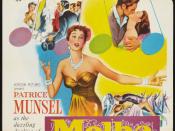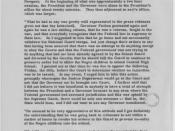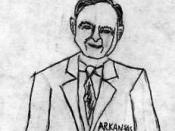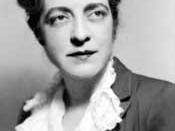As I read the novel Warriors Don't Cry written by author Melba Pattillo Beals, I became part of an audience exposed to both the racial and discriminatory acts imposed on a young girl who would play a pivotal role in the integration of Central High School. In my essay I will examine Melba Pattillo's battle to integrate central high, struggles involving the judicial and educational aspects of her battle, her personal battles and victories involving discrimination, and finally the sacrifice made by both Melba and her eight fellow warriors that would come to play a pivotal role in the civil rights movement.
The Supreme Court decision on May 24, 1955 in Brown V. Board of Education would say that separate but equal schools for whites and blacks were illegal. This decision would dramatically affect Melba Pattillo Beals now and in the coming days. The decision made by Melba to go to Central High would be followed by several attempts to keep her from going there.
Arkansas governor Orval Faubus tacitly, and sometimes overtly encouraged the violence in which would lead to President Eisenhower's decision to call in Federal troops on Tuesday September 24, 1957. These events would lead Melba through a virtual tug of war between the U.S. Supreme court decision and the decision of both Orval Faubus and the community to keep her from attending Central high. The decision by President Eisenhower to send in the 101st soldiers would path the way on September fourth, 1957, Melba's first day at central. I believe this decision by the President was a crucial step for the integration. A decision that made me as the reader determine that if not for this army, the nine would not have survived the integration and would not have been able to attend Central high.
During Melba Patillo Beals time at central High School she became a warrior on the front lines of a civil rights firestorm. During this time both the courage and dignity of young Melba will be tested on a daily basis. As the reader you are compelled by the complete destruction of Melba's innocence to receive a decent education, an education some still take advantage of today. Melba's willingness to endure such mental and physical pain shows her complete determination to overcome the prejudices put upon her by both the community and Orval Faubus. Although not everyone in her family and in the black population supported her dream Melba continues her dedicated pursuit. One incident that comes to mind when I ask myself "was it worth it"� is when Melba is attacked by a flagpole and by dynamite in the same day. If not for "Danny"�(Melba's assigned soldier) Melba might not have survived, making the presence of the soldiers seem that more crucial. (Page 151-152) During these first days of integration I think Melba takes a deep and sorrowful look within and decides the struggle that lie ahead for her and the eight others would surface their worst fears. "After three full days inside Central, I know that integration is a much bigger word than I thought."�(Page 154) During this time the author refers to struggling to hold on to herself. "I wanted to be alone so I could search for the part of my life that existed before integration, the Melba I was struggling to hold on to."�(Page 155) I think Melba is forced to reaffirm herself in god and the beliefs of her grandmother everyday and in doing this she looses somewhat of herself. Constantly relying on values and beliefs that are threatened on a daily basis. I believe she finds herself struggling to hold on to her beliefs, her innocence and her personal freedom.
The accomplishments achieved by both Melba and the eight others would make them apart of a very historical time during the civil right's movement. Despite the constant torture I do believe Melba did set some important goals for herself and did achieve them. She wanted to be a student at Central High school, she wanted a better education, and she was determined to create awareness for her people. Although these accomplishments may be somewhat overshadowed by the hardship she endured I do believe she was eventually successful in these goals. She did successfully complete her term at Central. She also although shunned by white students received somewhat of the same education they did. And finally receiving the national veterans "Americanism"� award, this did create awareness. (Page 235).
The sacrifice made by Melba and the other eight warriors was so severe that the questions of "was it worth it"� makes me as the reader reach inside and look at things on a much larger scale. When Melba first decided to go to Central High school she did not realize the torment and abuse she would later encounter. Throughout the abuse Melba remains somewhat strong in her religious and academic pursuits. Every day Melba is faced with self-defeating incidents that make her question why she is there. On the day that follows her last day of school Melba sets fire to the names of students and teachers that she felt had wronged her at Central High. (Page 303) This represents to me both closure and a sense of retaliation for the way she was victimized at Central. As an adolescent girl, I can only imagine how the constant ridiculing and name-calling must have affected her everyday. Adolescence is a struggle in itself without the extenuating circumstances that she encountered. "Please, God, let me learn how to stop being a warrior."� "Sometimes I just need to be a girl"�. (Page 217) As said here by Melba she was striped of her very own sixteenth birthday. Melba's outlook, "just another day of integration"�. (Page 217).
As a reader the UN humane things done to this young girl anger me. I am both angry and disgusted at how people can treat human beings and harbor so much hatred at an individual because they look different than themselves. I can only imagine the strength it took to hold back her feelings while being ridiculed and tortured. The way in which Melba handles herself I sometimes tended to disagree with. When looking at why I disagreed I came to realize that I was thinking from my own perspective as a white female. I myself can only imagine what it is like to live in constant fear of white people who where then, treated as the superior race. I also believe Melba reflects often on how her parents and grandmother deal with racial discrimination. This I feel both helps her to remain strong and survive. Unfortunately though, these methods are very sad and self-defeating. But were a necessary process in which to deal with her anger. Despite the hardships Melba and the eight experienced I do believe in the end Melba would benefit from this experience. I do think, "it was worth it"�. In the end Melba harbored much anxiety and a sense of unsettlement towards her experience. Although this was the case Melba would go on to become a very successful and admired individual. (Page 310-312) In conclusion I feel Melba Pattillo Beals was one of the most important people involved in the civil rights movement. I feel that although her experience was one I could not have endured. She did. In doing so she paved the way for integration and eventually understanding. Melba was successful in that she went on to tell the story of her personal battle. To educate the children of today about the horrifying and graphic truths about racism. Melba did gain a white friend by the name of "Link"� who I feel helped her to see it was possible for a white student at that time to have compassion for her. (Page 311) Melba was successful in creating awareness about the "Little Rock nine"� and their story. I do believe she has changed the lives of both blacks and whites by educating them on what happened to her at that time. Melba Pattillo Beals would educate me, the reader on something I knew little about and change my feelings towards history. That in itself is a reason Melba's story will continue to live on and educate its followers.
WARRIORS DON'T CRY Melba Pattillo Beals Kelly Rose History 17B





